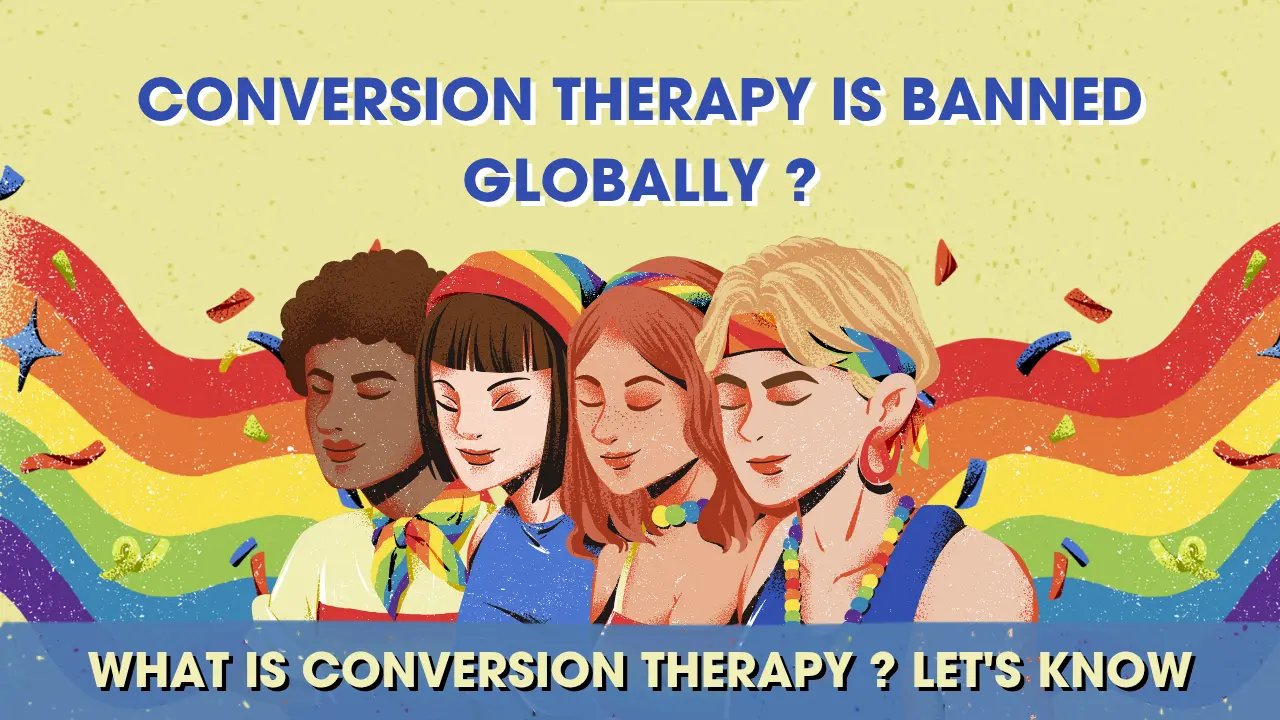Imagine seeking help from a professional, only to be told that a fundamental part of who you are—your sexual orientation or gender identity—is a disease that must be cured. That’s the reality of conversion therapy, a set of discredited and deeply harmful practices that claim to change a person’s identity to align with heterosexual and cisgender norms.
For decades, this pseudoscientific intervention—often euphemistically called “reparative therapy” or “sexual orientation change efforts (SOCE)”—has caused immense suffering. Today, a growing number of countries, states, and medical organizations are taking a firm, public stand by asking: Why is conversion therapy banned? The answer is clear: it’s banned because it is medically baseless, profoundly ineffective, and dangerously harmful. The global shift toward prohibiting this practice is a victory for human rights and mental health.
The Overwhelming Medical and Scientific Consensus
The single most critical reason why conversion therapy is banned is the unanimous opposition from the global scientific and medical community. This isn’t a political debate; it’s a matter of public health and ethics.
Conversion Therapy is Not Real Therapy
Major health organizations worldwide agree that LGBTQ+ identities are normal, healthy variations of human experience. This forms the foundation for rejecting conversion therapy:
- No Pathology to Treat: The World Health Organization (WHO) removed homosexuality from its International Classification of Diseases in 1990. Similarly, trans-related diagnoses were declassified as mental illnesses in 2019. If it’s not a disorder, it cannot be “cured.”
- A “Therapy” Without Evidence: Conversion practices lack any scientific credibility or clinical utility. The entire premise—that you can change a person’s core sexual orientation or gender identity—has been debunked by decades of research.
In fact, the American Medical Association, the American Psychological Association, and virtually every other mainstream professional health body in the US and abroad has officially condemned conversion therapy. When the most trusted experts in mental health and medicine say a practice is harmful and useless, policymakers must listen.
The Proven Risks: Harmful, Not Helpful
The practice is condemned not just for its ineffectiveness, but for its severe and documented psychological damage. The consequences for individuals, especially vulnerable youth, can be catastrophic and long-lasting.
Here are the devastating risks associated with conversion therapy:
- Increased Suicidality: Research has consistently found a terrifying link between conversion therapy and self-harm. According to a study from The Trevor Project, youth who experienced conversion therapy are more than twice as likely to attempt suicide compared to those who did not.
- Severe Mental Health Issues: Victims often report a cascade of mental health consequences, including severe depression, anxiety, shame, self-hatred, and post-traumatic stress disorder (PTSD). The forced repression of one’s authentic self can lead to a sense of inauthenticity and profound disconnection.
- Family and Social Damage: Conversion practices often drive a wedge between an individual and their family, community, or religious support system, creating social isolation that further exacerbates mental distress.
This profound harm is what pushes governments to legislate a conversion therapy ban. It is a necessary measure of consumer protection and child safety.
Human Rights and Legal Momentum
Beyond the medical consensus, the push to ban conversion therapy is rooted in fundamental principles of human dignity and rights.
A Violation of Human Rights
International human rights bodies have been increasingly vocal in their condemnation. The core concern is that conversion therapy often constitutes cruel, inhuman, or degrading treatment, and can even rise to the level of torture.
Also Read: Nobel Prize 2025 in Physics: Clarke, Devoret and Martinis Unlock the Quantum Future
In a 2020 report, the Independent Expert mandated by the United Nations Human Rights Council on protection against violence and discrimination based on sexual orientation and gender identity called for a global ban on the practice. This recommendation highlights the view that conversion practices are inherently discriminatory, seeking to erase the existence of non-heterosexual and non-cisgender people.
A Quote for Authority:
As stated by the UN’s Independent Expert, “The overwhelming scientific consensus is that so-called ‘conversion therapy’ is not only ineffective but deeply harmful… It is often violent, cruel and humiliating.” This underscores the international legal imperative to enact a conversion therapy ban.
Global and Local Action
The legal landscape is rapidly changing as governments recognize their duty to protect citizens from these practices. While the global fight continues, many jurisdictions have already implemented bans, creating a powerful international trend:
- National Bans: Countries like Canada, France, Germany, Malta, New Zealand, and Ecuador have enacted nationwide bans, either completely or for minors and licensed professionals.
- Regional and State Bans: In the United States, dozens of states and the District of Columbia have passed laws restricting licensed medical professionals from performing conversion therapy on minors.
This growing momentum shows that the ban on conversion therapy is becoming a standard measure for a civilized, rights-respecting society. To learn more about other landmark LGBTQ+ protections, check out our related article: [Internal Link: The History of Marriage Equality]
The Difference Between Conversion and Affirmative Care
A common point of confusion is the difference between a harmful “cure” and helpful, ethical counseling. A conversion therapy ban does not prohibit a professional from discussing faith, identity, or internal conflict. What it does prohibit are practices with the explicit goal of changing a person’s core identity.
Ethical Mental Health is Affirming
Ethical, mainstream mental health care for LGBTQ+ individuals is focused on affirmation, acceptance, and support. Instead of trying to change an immutable trait, a good therapist helps clients navigate challenges, reduce internalized shame, and live authentically.
This type of therapy supports individuals struggling to reconcile their identity with their religious, cultural, or family values. It’s about adaptation, coping, and self-acceptance, not forced conversion. For more on finding supportive resources, you might find this post helpful: [Internal Link: Understanding Gender Identity and Expression]
The Financial and Ethical Cost
While the human cost of conversion therapy is immeasurable, there are also significant financial burdens. The associated harms—substance abuse, emergency mental health interventions, and long-term psychological care—can strain public health resources. One study estimated the associated harms of conversion therapy cost the U.S. an estimated $9.23 billion annually. Banning the practice is not only ethically sound but also a wise public policy for community well-being.
Furthermore, when practiced by licensed professionals, conversion therapy represents a massive ethical failure. It is a direct violation of the fundamental ethical principle of “Do No Harm,” essentially allowing medical licenses to be used to perpetrate psychological abuse. This is why conversion therapy is banned for licensed practitioners in many jurisdictions—to uphold the integrity of the medical profession.
Upholding Dignity Through Policy
The question of why conversion therapy is banned can be answered simply: because it’s a dangerous form of abuse masquerading as medical help. It fails to change a person’s sexual orientation or gender identity and succeeds only in inflicting long-term, severe psychological damage, dramatically increasing the risk of suicide.
The global movement to pass a conversion therapy ban is a commitment to the dignity and safety of all people, particularly vulnerable LGBTQ+ youth. It is a declaration that love, identity, and authenticity are not illnesses to be cured but fundamental aspects of the human spirit to be protected and celebrated.
FAQs
Q1: What exactly is conversion therapy?
Conversion therapy is a discredited and harmful practice that attempts to change an individual’s sexual orientation or gender identity to heterosexual or cisgender. It can include a range of methods, from “talk therapy” and religious counseling to more extreme, historically used techniques like aversion therapy, all based on the false premise that being LGBTQ+ is a mental illness or flaw.
Q2: Is conversion therapy effective?
No, conversion therapy is universally considered ineffective at changing a person’s core sexual orientation or gender identity. All major medical and mental health organizations agree that these traits are not conditions that can be “cured.” Attempts at conversion only lead to significant psychological distress and harm.
Q3: Why is conversion therapy banned for minors in many places?
Conversion therapy is banned for minors because children and adolescents are especially vulnerable to its psychological abuse. Being subjected to this practice significantly increases their risk of depression, anxiety, self-harm, and suicide attempts. Banning it for minors is viewed as a crucial child protection measure.
Q4: Does the ban on conversion therapy restrict religious freedom or free speech?
Legal consensus generally holds that banning conversion therapy for licensed professionals does not violate free speech or religious freedom. The ban regulates the conduct of licensed health professionals to ensure they are providing evidence-based, ethical care, which does not include a harmful, discredited practice. Religious counseling remains distinct from professional, licensed therapy.
Q5: What is the alternative to conversion therapy for people struggling with their identity?
The ethical alternative is affirmative care. This approach helps an individual explore and accept their identity without judgment, offering support to reconcile any internal or external conflicts (such as family, cultural, or religious beliefs) without attempting to change their core orientation or identity.














